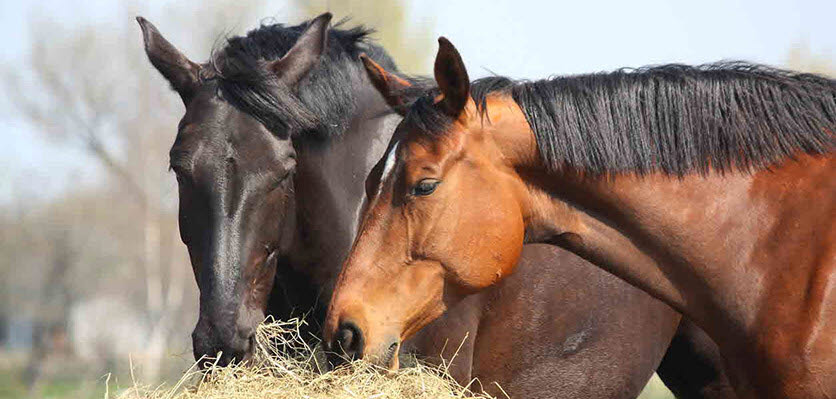Horse health – the basics

The horse is a majestic animal and part of being a responsible owner is to provide them with quality care and attention. While it can seem time-consuming, spending time with your horse and keeping an eye on their general health will not only make their life a long and happy one, it will also reduce veterinary bills.
According to Agriculture Victoria, the basic requirements for caring for horses are as follows:
Feed
Horses must have access to an adequate amount of good quality feed in the form of roughage (pasture, hay or chaff) to keep them in good body condition. A guide to the amounts to feed is 1-2 kg per 100kg of body weight. You may need to supplementary feed a horse that is being worked regularly or if there is not enough pasture and the horse is losing body condition. Provide a salt lick or mineral block in paddock. Check with your veterinarian for suitable supplementary feeds – grass clippings and many food scraps are not suitable feed as they can cause a horse to become ill.
Water
Clean water must always be available. A dam or self-filling trough is best. Bath tubs, if used, must be checked daily and re-filled if necessary. Dams and self-filling troughs should also be checked frequently. Buckets are not suitable as a permanent water supply as they can be tipped over. As a guide, a horse may drink 25-45 litres per day in hot weather.
Shelter
Horses need shelter from extremes of sun, wind and rain. Trees or a walk-in shed/stable make suitable shelter. A waterproof rug can be used to protect the horse from cold weather but must be checked daily to ensure it is not rubbing, slipping or leaking.
Exercise/space
Horses must have enough space to walk and run around, unless they are exercised daily. Tethering of horses is only acceptable for short periods of time and requires daily supervision and inspection, provision of adequate feed and water, suitable tethering equipment and flat terrain. Horses must not be tethered long-term.
Paddocks
Fences must be kept in good repair to prevent injury and escape. Remove rubbish and weeds regularly to prevent injury to the horse. Be aware to prevent threats such as loose wire or attractions such as a neighbouring horse that can cause a horse to be injured by a fence.
General health care
Feet
Have a farrier trim the hooves every 6-8 weeks to prevent them chipping or becoming too long and uncomfortable for the horse. Shoes are only needed if the horse is to be ridden on hard or rocky ground.
Teeth
Teeth need to be checked by a veterinary dentist at least once a year for a horse kept in a paddock. If not treated, they can become sharp and cause pain and mouth injuries. Horses under the age of five, or those fed grain, need a dental check at least once every 3-6 months.
Worming
Worm your horse regularly to prevent worms building up in the stomach and intestines. Many worming pastes require use every 6-8 weeks. Follow the directions on the product as dosage frequency and amounts vary. Reducing the build-up of manure in your horse's paddock is also a simple way to reduce worm contamination of pastures.
Vaccination
A veterinarian should vaccinate your horse for diseases such as tetanus, viral respiratory disease and strangles. Your veterinarian will advise what your horse should be vaccinated for and how often.
Health checks
Do not let your horse get too fat or too thin. As a guide, if the ribs are showing it means the horse is too thin. A round rump, big belly and crested neck means the horse is too fat. Ideally ribs should be able to be felt but not be seen.
Regular grooming will alert you to changes in your horse’s health and will accustom your horse to being handled. You should also have your horses checked regularly by a veterinarian.
Horse owners find it helpful to use a specialist equine veterinarian to look after their horse’s health. Many of these veterinarians are members of Equine Veterinarians Australia (EVA), a special interest group of the Australian Veterinary Association.
EVA is the representative body for equine veterinarians in Australia, offering membership to veterinarians who treat horses as part of their practice. With an emphasis on providing the support members need to remain at the forefront of equine veterinary medicine, EVA also represents the interests of members to governments and equine industry groups.
EVA maintains strong links with both equine organisations and horse owners. An important role for EVA is providing advice and information to the people who care for horses to ensure that Australian horses enjoy the best possible health and welfare.
